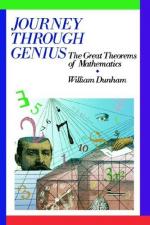
|
| Name: _________________________ | Period: ___________________ |
This quiz consists of 5 multiple choice and 5 short answer questions through Euclid and the Infinitude of Primes.
Multiple Choice Questions
1. Which of the following is an example of a perfect number?
(a) 6.
(b) 10.
(c) 20.
(d) 1.
2. "Straight lines in the same plane that will never meet if extended forever" is a definition of what?
(a) Intersection.
(b) Parallel lines.
(c) Circle.
(d) 180 degree angle.
3. Which of the following is true in modern math about twin primes?
(a) We don't know if they are finite or infinite.
(b) They are infinite.
(c) Their sum is always another prime number.
(d) They are not considered whole numbers.
4. What did Hippocrates do that advanced mathematical methods?
(a) He built theorems based on sequencially more complex proofs.
(b) He proved that mathematics can be applied in a unlogical order.
(c) He demonstrated that geometry does not have to be based on previous knowledge.
(d) He created a new ways to disprove theories.
5. Which is one of the common notions presented in Elements?
(a) "Points with equal values can be connected with a line of equal value."
(b) "Things with are equal have an inverse that is equal."
(c) "The inverse of a line makes a circle."
(d) "Things which are equal to the same thing are also equal to each other."
Short Answer Questions
1. What were the proofs in Elements based on?
2. How did Lindeman prove his conclusion?
3. What was Hippocrates's great advance to mathematics?
4. What did Dunham consider extraordinary about the Elements?
5. Numbers whose divisor add up to itself, was considered which type of number according to Euclid?
|
This section contains 347 words (approx. 2 pages at 300 words per page) |

|




